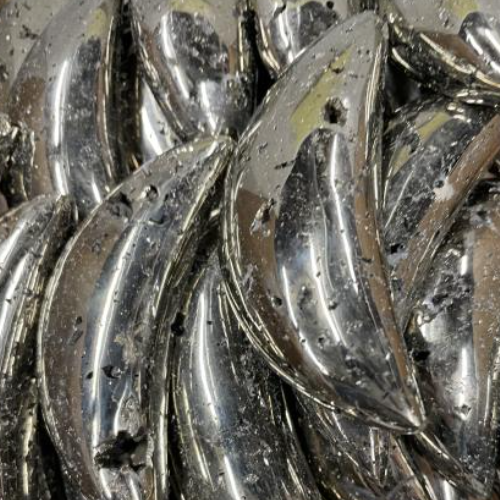Product Description
Rhodonite Moon Crescent 4"
Mineral Information:
Rhodonite is a mineral and a gemstone known for its distinctive pink to red color with black or brown manganese oxide veining. It belongs to the group of minerals called inosilicates and has a chemical composition of manganese inosilicate (MnSiO₃). Rhodonite is named after the Greek word "rhodon," which means "rose," referring to its pink hue.
Here are some key characteristics and properties of rhodonite:
Color: Rhodonite typically exhibits shades of pink or rose-red as its base color. It often contains black or brown veins or patterns of manganese oxide minerals, which create a striking contrast against the pink background.
Hardness: On the Mohs scale of mineral hardness, rhodonite has a hardness of 5.5 to 6.5. While not as hard as some gemstones like sapphire or diamond, it is still relatively durable and suitable for jewelry use.
Appearance: Rhodonite is usually found in massive or granular form, meaning it lacks distinct crystal formations. It has a vitreous to pearly luster when polished.
Origin: Rhodonite is found in various regions around the world, including Russia, Sweden, Australia, Canada, Peru, and the United States.
Uses: Rhodonite is highly regarded as a gemstone and is commonly used in jewelry, including rings, pendants, bracelets, and beads. Its attractive pink color and unique patterns make it a popular choice among jewelry enthusiasts. It is also used in ornamental carvings, sculptures, and as a lapidary material.
Metaphysical Meaning:
Rhodonite is often associated with emotional healing, compassion, and love. Rhodonite is thought to support emotional balance, forgiveness, and the release of past wounds or traumas. It is believed to stimulate the heart chakra and promote self-love, compassion for others, and harmonious relationships.
Mineral Care:
Rhodonite is generally considered a relatively durable gemstone with moderate hardness. However, like all gemstones, it has its own level of fragility that should be taken into account when handling and caring for it.
Here are some factors related to the fragility of rhodonite:
-
Hardness: Rhodonite has a hardness of 5.5 to 6.5 on the Mohs scale, which makes it moderately hard. While it can resist scratches from common materials, it is softer compared to gemstones like sapphire or diamond. Therefore, it is important to avoid exposing rhodonite to materials or surfaces that are harder than it, as they can cause scratches or abrasions.
-
Cleavage: Rhodonite has good cleavage, which means it can break along planes of weakness. Although it is not highly prone to cleavage-related breakage, it is still advisable to handle rhodonite with care to avoid applying excessive force or impact that could potentially cause it to split or fracture.
-
Impact and Pressure: Rhodonite, like many gemstones, can be damaged by impact or pressure. Dropping rhodonite jewelry or subjecting it to high pressure can result in fractures, chips, or even complete breakage. It is important to handle rhodonite with caution and avoid exposing it to activities or situations where it may be subjected to sudden impacts.
-
Chemicals and Heat: Rhodonite is generally resistant to most household chemicals. However, it is best to avoid exposing rhodonite to harsh chemicals, including acids or strong solvents, as they may cause damage or discoloration. High temperatures or sudden temperature changes can also be detrimental to rhodonite, so it is advisable to keep it away from extreme heat or rapid temperature fluctuations.
To care for rhodonite and minimize the risk of damage, it is recommended to store it separately from other gemstones or jewelry items to prevent scratching. Clean rhodonite using mild soap, lukewarm water, and a soft cloth. Avoid using ultrasonic cleaners or steamers, as they may have a detrimental effect on the stone.
By handling rhodonite with care and being mindful of its fragility, you can help preserve its beauty and integrity for a longer period of time.
Disclaimer:
No information here is intended to diagnose, treat or cure ailments or afflictions of any kind. One should always consult a medical professional if a serious issue presents itself.





